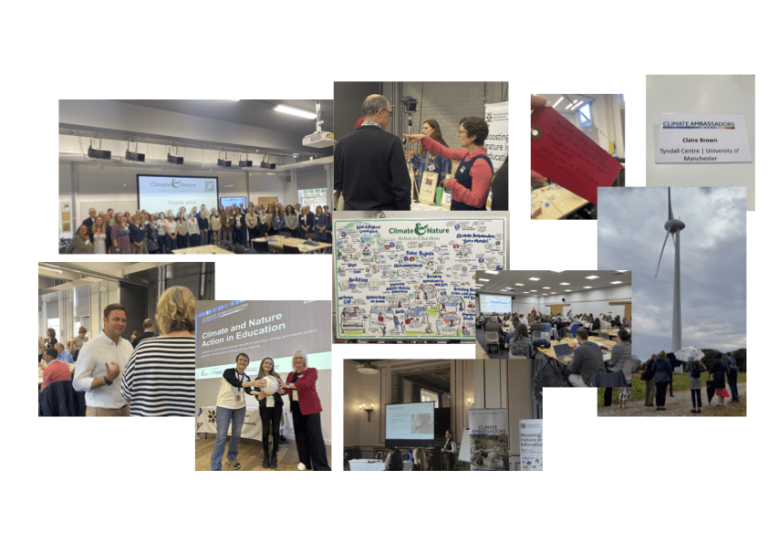go through: Professor Andrew Charlton Perez
As some of you may know, it’s an exciting time for climate education efforts lately, with universities increasingly becoming involved. work to get involved and hopefully get some of you excited to join the effort. Maybe even through our new It's time to make a change policy.
Hopefully everyone in the department understands why this work is so important. For too long, education about climate change in schools has remained fragmented and inconsistent, despite the efforts of many excellent teachers. This is reflected in what young people say about climate education – check out the incredible teach the future activities – and in Graduates’ climate literacy.
As part of our preparations for COP26, a group of colleagues at the University have devoted considerable effort to this topic and developed a National Climate Education Summit. It was largely a lockdown project that got out of control. Through this summit, we quickly realized there was a huge appetite for creative and practical thinking about how to improve climate education, so we developed National Climate Education Action Plan (NCEAP) with partners including RMeS. This work is impactful – for example informing the Department for Education (DfE) Sustainable development and climate change strategies. The group established through the Summit continues to meet regularly with more than 70 organizations, contributing to our continued efforts to improve climate change education. For example, you can see our recent work Climate change can be integrated into the curriculum.
A key idea raised by the action plan is that the education system needs help from the expertise of universities, government and the private sector to move forward. In particular, in order to achieve the Government's objectives for all educational institutions climate action plan Once in place next year, we need to mobilize this expertise quickly and effectively.
From this idea was born climate ambassador This program is generously supported by STEM Learning, who provide the platform and tools for the program at no charge. I’m extremely proud that this simple idea has now grown into one of the largest climate education programs in the world. After winning UK Department of Education provides £2 million in funding In January, we have been able to significantly expand the program. The Climate Ambassadors Alliance, which I co-lead with Charlotte Bonner of EAUC, has been formed nine regional centers The Met Office and eight universities (including the University of Reading). Our excellent Regional Center Manager Gemma Bailey has been responsible for the South East region and the project is now managed by Jessica Gardner.
It's been great fun working with colleagues old and new as we continue to grow and develop the program. To date, we have recruited 720 ambassadors – a huge achievement and an important team of volunteers. But we need to go one step further and we need your help, can you sign up to help us? For details on how to do this, please visit STEM learning website.
Ultimately, despite the success of the program and our key partners National Educational Nature Park, Education sustainable development support and Let's get back to zero It will be measured by our ability to effect change in climate and nature education across our education system. In September, we kicked off this exciting year of action on climate and nature education with a series of nine related events across all regional centres. I’ve attached some photos of this work below, the enthusiasm and energy of the participants was contagious. Teachers, school and university leaders are hungry for change, but we need to keep working to make this change a reality.

Excitingly, this effort does seem to be paying off. In the past ten months, Climate Ambassadors have supported more than 500 nurseries, schools and colleges. Across the four projects I mentioned above, nearly 4,000 education providers (more than 15% of England's total) are already involved. There is, of course, a long way to go, but in just a few years we have collectively generated huge momentum – moving towards the Department for Education’s vision to lead the world in climate action in education.
So what’s next? As I'm sure many of you are aware, one of the first actions of the new administration will be to launch a Review curriculum and assessment The entire education system led by Professor Becky Francis. The university will join many other organizations in advocating for a review that puts high-quality climate education at the heart of subsequent reforms. Monday (4th In November) NCEAP will be hosting a public meeting where we hope a number of different organizations will be able to share their ideas on how to achieve this.
Being involved in this work over the past three years has given me great personal satisfaction. Thank you to the hundreds of volunteer Climate Ambassadors who so generously and willingly donate their time. While this may be the hardest work of my career, the satisfaction I get from the work we do as a small team at the university, as a dedicated and dedicated coalition, and as an entire community of organizations seeking to effect real change is Huge. As a principal, I hope that you and my colleagues get the same joy from your work!
